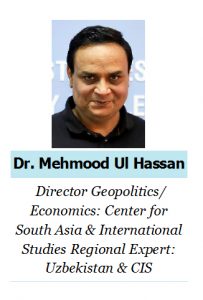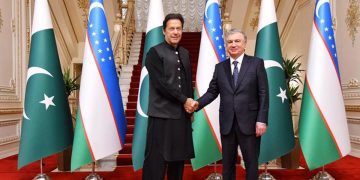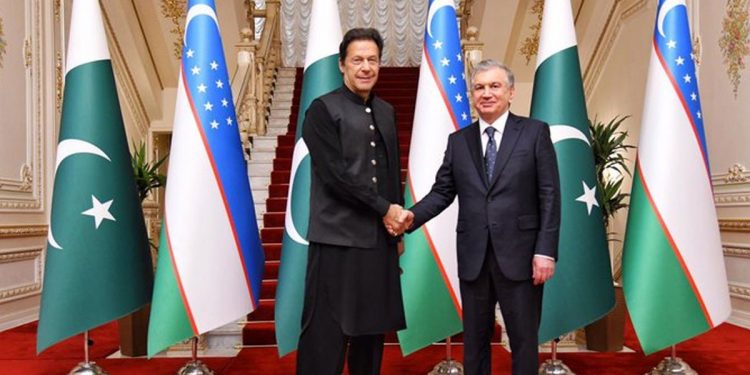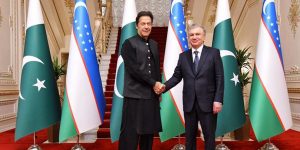 The President of Uzbekistan H.E. Shavkat Mirziyoyev starts his historic visit to Pakistan today. Before his arrival 7th Joint Ministerial Commission and 2nd Joint Business Forum were held in Islamabad.
The President of Uzbekistan H.E. Shavkat Mirziyoyev starts his historic visit to Pakistan today. Before his arrival 7th Joint Ministerial Commission and 2nd Joint Business Forum were held in Islamabad.
The Republic of Uzbekistan the new powerhouse of Central Asia has succeeded to achieve high rates of GDP, GNP, reduction of poverty, inflows of FDIs and last but not least massive industrialization due to its permanent economic structural reforms since 2016. The strategic vision of President Shavkat Mirziyoyev has actually “revolutionized” macro-economy and various sectors of Uzbekistan through “velocity of reforms”, “vanity of agriculture”, “validity of massive industrialization” and last but not least, “vehement of human capital”. Hopefully, visit of President Mirziyoyev will further stimulate inflows of FDIs, imports & exports, joint ventures, transportation facilitations, energy cooperation and above all means of greater regional connectivity.
Uzbekistan’s national strategy phase-I” has streamlined the national economy, productive channels and introduced and implemented rigorous policy structural reforms due to which the formerly isolationist nation has “revamped” its foreign policy to embrace “multilateralism” and establish friendly ties. Uzbekistan’s economic transition from “plan to market”, from market to liberalized economy and last but not least, liberalized economy to smart economy has been systematized in which even commercial diplomacy has played a decisive role.
Moreover, the its “National Strategy Phase-II” is related to the task of increasing the “competitiveness” of the national economy by deepening structural reforms, modernizing and diversifying its leading sectors.
Fortunately, the “Road Map” of the main directions of structural reforms of the Republic of Uzbekistan for the period 2019-2021, was developed with the participation of international financial institutions. Implementation of successive structural reforms in 2019 has actually “broadened” up “horizon” of economic, financial, banking, investment, energy, engineering and ICT cooperation between Uzbekistan and Pakistan.
Structural reforms have further increased the share of industry, service sector, small business enterprises and private entrepreneurship as well as the advanced development of high-tech production of finished products in its national economy. It seems that Uzbekistan is moving towards ach
ieving “economic wonders” in the days to come.
According to latest official figures (January 2022), real GDP increased by 6.9 per cent year-on-year during 2021 mostly driven by services, manufacturing and mining. Investment activity remained steady with fixed investment up by 5.0 per cent year-on-year during 2021.
Moreover, the expansion in services, manufacturing and mining was particularly strong (7.6, 7.4 and 14.2 per cent year-on-year, respectively. It strongly indicates a huge potential to expand its ties with Pakistan especially in service, manufacturing and construction sectors in the days to come.
Inflation has slowed (10.8 per cent in September 2021 versus 14.2 per cent a year earlier) due to currency stabilisation and conservative monetary policies implemented by its central bank. The policy rate was reduced from 16 per cent in early 2020 to 14 per cent in September 2020.
Interestingly, GDP will even expect to grow by 6.0 per cent in 2022. A remittance-led surge in private consumption along with increased investment in infrastructure will be the key stimulating agents of GDP growth.
The Global Innovated Index (2021) has declared Uzbekistan as one of the most innovated countries of the CIS. Now it seems that Uzbekistan is on the path of innovations, Artificial Intelligence and massive digitalization.
In this context, president Mirziyoyev through a presidential decree in October 2020 has approved “Digital Uzbekistan-2030″ strategy”. For greater digitalization more than 280 projects will facilitate the digital transformation of regions and sectors, aiming to double the share of digital services in GDP in the next two years. As part of the strategy, three new data centres will be launched, in Tashkent, Bukhara and Kokand. So it has further brightened the chances of bilateral cooperation in the fields of ICT, digitalization and Artificial Intelligence sectors between two countries.
Since climate change is a looming threat, Uzbekistan has made a commitment to reach carbon neutrality in power generation by 2050. It aims to develop power sources with low-carbon emissions, including solar, hydro, wind and nuclear, as well as modernize the electricity grid. There is a huge potential of future cooperation in the fields of “climate change”, “bio-diversity”, “ecological development”, “organic agriculture”, “veg-agro”, “water conservation” and last but not least hybrid seeds between Uzbekistan and Pakistan in the days to come.
Uzbekistan has been doing great job in terms of protection and provision of human rights, child labour, women empowerment and basic necessities of life to its people without any discrimination since its inception. Now it has made major progress in eliminating child labour and forced labour in the cotton industry. In this connection, the latest report of International Labour Organization (ILO) (December 2021) has confirmed that systematic child labour is not being used during the cotton harvest in Uzbekistan.
Moreover, to improve the balance of payments equation, Tashkent is investing in adding value to production. Uzbekistan’s biggest export item is now textiles. The state is aggressively targeting value-added exports. Raw cotton exports have been banned. Cotton growers are thus forced to invest in textile production. Since ours is the age of value-addition thus both countries should cooperate in this sector.
In addition to this, energy of Uzbekistan has numerous opportunities for investments. There are multiple major renewables projects. The government desires the share of renewable energy in energy generation to hit 25 percent by 2030. It seems that “economics of energy” has great befitting propositions for both countries and businessmen and investors of Pakistan should seriously avail this golden opportunity in Uzbekistan.
However, Uzbekistan’s macroeconomic development in 2022 should be founded on gradual improvements in external and internal indicators, as long as no significant external risks come to pass.
Uzbekistan has now surpassed its neighbors in terms of economic recovery, high growth rate, gradual fiscal consolidation, continuing access to external financing, and reforms in agriculture, construction, and industrial sectors. Thus holistic concept of “New Uzbekistan” is on the march enabling the country to achieve greater socio-economic prosperity, massive industrialization, institutionalization of green energy, development of renewables, robust service sector, generation of new jobs, and eradication of poverty and above all nurturing of qualitative human rights.
According to budgetary estimation (January 2022), GDP in 2022 is expected at $74.2 billion with a per capita income of $2,100, with the real growth rate of the economy projected at 5.9 to 6.8 percent.
The government is reconsidering its investment policy to expand the number and scope of special industrial zones to accelerate the implementation of projects. Due to activation of CPEC Pakistan has rich experience of SEZs which should be shared with Uzbekistan for its further economic growth in different key sectors.
Uzbekistan government has managed to wither the pandemic comparatively well which may permit it to make a strong economic recovery. The timely and forceful actions to save lives and livelihoods did save the country from any catastrophe. “Capacity building” in health sector offers numerous win-win propositions for both the countries which need to be explored and exploited in the days to come.
According to latest statistical data (December 2021), during 2021 total exports were $16.5 billion, an increase of about $1.3 billion compared to 2020. New projects worth $12.4 billion were launched at the national and district level. While net tax receipts from products and export-import operations amounted to 7.4 percent, the added value in the projected gross domestic product amounted to 92.6 percent of GDP, with the largest share of value (35.8 percent) contributed by the service sector. Industries will bring 25.9 percent, and construction 6.3 percent, followed by agriculture, forestry, and fisheries making a combined contribution of 24.7 percent. “Industrial cooperation” is the need of the hour which will further enhance their collective national standings at international stage.
In late 2016, Uzbekistan surprised everyone. It started structural reforms. The government proceeded most resolutely with liberalizing prices and foreign trade and unifying the exchange rate.
Furthermore, the tax system has been further simplified and made more neutral through a complete overhaul of tax policy and improved tax administration. Fiscal and debt transparency has been substantially improved. The changes in fiscal policy and the structure of government finances have supported the transformation of the economic model and have laid the groundwork for future economic expansion.
Progress with enterprise restructuring, privatization, and introducing a supportive investment framework for new private firms has been getting momentum and seemingly on right path of growth and consolidation. Private enterprises have started to spring up and become a bit bigger.
To conclude, the government of Uzbekistan has achieved great success in its economic reform priorities for 2019-2021. The roadmap contained five major pillars, maintain macroeconomic stability, accelerate the market transition, strengthen social protection and citizen services, align the government’s role with the needs of a market economy; and preserve environmental sustainability. In this context, commercial diplomacy must be mantra of Uzbekistan and Pakistan in the days to come.
Due to strategic vision of President Shavkat Mirziyoyev Uzbekistan’s positions have improved markedly in a number of international rankings, including the Index of Economic Freedom, the World Bank’s Doing Business Index, the OECD Country Risk Rankings, and the World Open Data Rankings.
Furthermore, the EU has granted Uzbekistan ‘GSP+’ trade beneficiary status, and recently the UK did so too. The country is in the process of joining the WTO. Thus future economic prospects of Uzbekistan are healthy and positive. It is estimated that Uzbekistan’s GDP will grow by 6 percent in 2022.
Furthermore most of the international rating agencies and financial institutions have already rated Uzbekistan as the “fastest growing economy” in Central Asia. Uzbekistan and Pakistan should further enhance cooperation in textile, garments and embroidery sectors. Uzbekistan is blessed with “colored cotton” which should be translated and transferred to Pakistani counterpart in the days to come.
In this connection, a new State Owned Enterprise (SOE) strategy for 2021-25 aims to reduce the state’s footprint in the industrial, mining and manufacturing sectors, and ensures that SOEs are governed and managed in line with market principles. Thus it has encouraged private sector and its investments in macro-economy.
The policy makers of Uzbekistan should step up efforts to accelerate digital transformation. Investment in broadband infrastructure, digital skills and the information technology ecosystem is essential to enable remote working and learning for all groups of the population. The government should adjust reform priorities in light of the post-Covid-19 situation.
In the short term, priority should be given to macroeconomic stabilisation, continued improvement of the investment climate and other measures to build investor confidence. Earlier plans for large-scale privatisation of state-owned banks and enterprises may have to be delayed to include restructurings in case of a slower-than-expected economic recovery or adverse market momentum.
Hopefully, President Shavkat Mirziyoyev visit to Pakistan will be “game” and “fate” changer for both the countries and a “giant step” towards persuasion of greater regional connectivity, peace and stability and infrastructural development.






